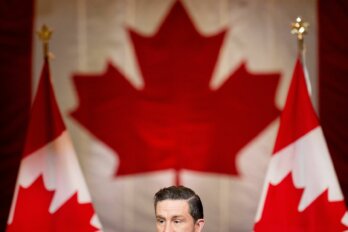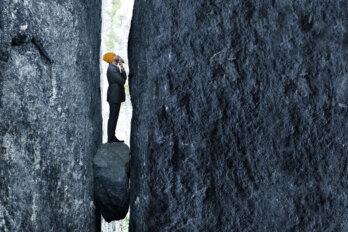In Canada, and even many parts of the United States, Donald Trump is dismissed as a joke. Many of the policies he has proposed—make Mexico pay for a giant wall, ban Muslims from entering the US, institutionalize the use of torture—would be impossible to implement. In a way, Ted Cruz was a scarier Republican presidential candidate, because Cruz backed policies that, while extreme, could theoretically be achieved under an administration run by true right-wing zealots.
But the Trump phenomenon seems less of a joke when you consider that his brand of xenophobia has become a political growth industry across many parts of the world.
The Brazilian version of Donald Trump is a sixty-one-year-old presidential aspirant named Jair Bolsonaro. Like Trump, he laughs off torture perpetrated against enemies of the state. And he takes Trump’s sexism and bigotry to another level. During a recent session of Congress, he taunted a female legislator: “I would not rape you. You don’t merit that.” (He then mocked the woman for leaving before he had finished berating her.) And like Trump, he is phobic about migrants, describing new arrivals as “the scum of the world.”
The Filipino version of Trump already has been elected president. Rodrigo Duterte has confessed openly to dictatorial tendencies. Like Bolsonaro, he is an open homophobe who makes jokes about raping women, and who postures as a defender of the hard-done-by everyman. “[Duterte] presents himself as a simple man fed up with the system, vowing to fix the nation at all costs,” notes Filipino novelist Miguel Syjuco. “He has been linked to more than 1,000 extra-legal executions of petty criminals during his time as mayor [of Davao City]. Not only has he admitted to supporting the killings, he has promised that as president he will ‘turn the 1,000 into 100,000’ and dump their bodies in Manila Bay.”
Duterte, Bolsonaro and Trump have different backgrounds and platforms, reflecting their different societies. (Violent crime is a far more serious problem in, say, Manila and Rio de Janeiro than in any large American city.) But the overall pitch is the same:
I am here to blow up the established political class. I am beholden to no one, and the proof is that I will say things that horrify people with power and education. I will eliminate the threats that terrify you by using tactics that others are too weak and politically correct to consider.
These Trump-style populists promise voters that they will return their society back to a more noble, authentic, orderly, old-fashioned, hard-working version of itself. In doing so, they assume the posture of manly, old-fashioned patriarch—an alpha-male role that, as they imagine it, gives them license to crassly belittle anyone who seems weak or effeminate.
The examples of Turkey’s Recep Erdoğan and Russia’s Vladimir Putin demonstrate that aspirationally democratic societies can be dragged back into autocracy by charismatic strongmen who focus popular agitation on outside threats. The Trump phenomenon shows us that even wealthy, well-established democracies are now at risk. The next president of once-sleepy Austria may well be Norbert Hofer of the anti-immigrant Freedom Party. Analogous anti-immigrant movements have seized control of the political agenda in Poland, Hungary, France, Germany, and even the UK.
In all cases, these populists advocate a return to culturally rooted values, and push back against the forces of globalization. Hofer says he would block implementation of an EU–US trade deal. Donald Trump has even railed hard against NAFTA, something no leading Republican presidential candidate has done since the days of Patrick Buchanan.
Not so long ago, isolationist movements of this type typically were fuelled by anti-Semitism—since Jews were seen as the human embodiment of rootlessness and financial opportunism. But since 9/11, nativists have moved on from Jews to Muslims. Open hostility to Arab and South Asian refugees is a universal constant among today’s populists—and sometimes is expressed in the form of out-and-out hate speech, which casts Muslims as inveterate rapists whose animal-like reproduction rates will swamp Western host societies.
Typically, anti-immigrant politicians are described as “far-right.” But that’s misleading. In Europe, men such as Hofer oppose Muslim migrants typically because they believe that the newcomers will challenge liberal Western social norms, and bankrupt the welfare state. The same is true of Geert Wilders in the Netherlands. In the US, meanwhile, Trump supporters are just fine with trade barriers, social security and even socialized medicine (at least in the form of Medicare), so long as these big-government policies help the “right” people—which is to say, people who look like they do. In his definitive Atlantic magazine cover story on the crack-up of the GOP, David Frum quotes Harvard researcher Theda Skocpol to the effect that pessimistic Republicans “judge entitlement programs not in terms of abstract free-market orthodoxy, but according to the perceived deservingness of recipients.”
And what about Canada? I always check myself when I feel the urge to write a column about our moral superiority. But on this issue, Canada really does stand apart. There is no mainstream anti-immigrant party in Canada. Nor any mainstream anti-immigrant media outlet. Nor advocacy group. One of the most disastrous decisions Stephen Harper’s government made was to appear heartless in response to the 2015 migrant crisis. When Justin Trudeau was elected, he personally greeted incoming refugees at an airport—a masterstroke that would have been treated as political suicide in many other countries. Nor do any of the major Canadian political parties advocate a substantial rollback in free trade or investment. We are perhaps the only nation on earth whose politicians and media have unanimously made peace with the forces of globalization.
To the extent that Canada ever was going to have a Donald Trump moment, we arguably already had it. Stephen Harper’s Conservatives railed against niqabs and foreign-funded NGOs, created an old-stock patriotism cult around the War of 1812, and promised ever-harsher treatment of criminals. But it never quite caught on as a long-term political strategy among anyone under fifty. When the Tories tried to take health care coverage away from asylum seekers, they were soundly rebuked by judges and pundits alike, and retreated. In the end, Canadians simply had no real appetite for this sort of policy. In fact, under Justin Trudeau, we increasingly have come to embrace the outward rejection of narrow-minded nativism as a defining feature of our national brand.
Why? Firstly, our immigration policies—which emphasize job skills—encourage more rapid assimilation into Canadian society than in Europe, where migrants often languish in ghettoes. Second, unlike the nations of Europe, we are a difficult destination for Muslim refugees to reach, which means we always will be less receptive to fears that our society is under “siege” from hordes of newcomers. And third, unlike the US, we are no longer a self-consciously Christian society—so the idea of newcomers changing the religious balance of Canada does not lead to Cruz-style apocalyptic rhetoric about “creeping Sharia” and so forth. And finally, there is the fact that few nations have benefited more from free trade over the last twenty years than Canada: Even the NDP is hard-pressed to put up much of a fight against open borders.
Arguably, there is a fifth factor as well: For as long as any of us can remember, Canadians have enjoyed defining themselves, at least in part, in opposition to the American identity. And so as the US becomes the land of fear, we become the land of hope.
All this may help explain why we Canadians are deriving so much schadenfreude from Trump’s phobic antics, even if the global problem he represents is real and worrying. He reminds us that, in this way at least, we Canadians truly have created a more tolerant, pluralistic, welcoming, even-keeled society than the US (and, in fact, the rest of the world more generally).
To assert our moral superiority feels like a trite and even obnoxious thing for a Canadian pundit to do. But every once in a while, Canada deserves to come out and take a bow.





